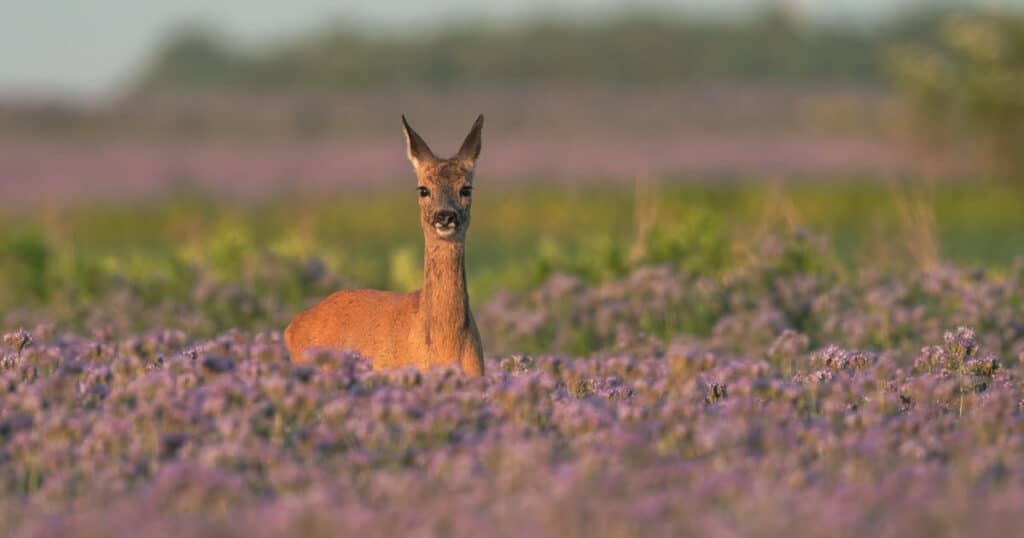Lavender is a great herb for brightening up your garden. It smells fresh, is easy to grow, and has many uses. But if you grow it, do you have to worry about your hungry local deer herd? Do deer eat lavender?
If you live in an area with a large deer population, you know how much these animals love munching on garden plants. Is lavender one of them?
Do Deer Eat Lavender? (Answered)
No, deer don’t eat lavender. Deer are known for eating just about anything they can get their mouths on, but there’s no need to worry about deer eating up your lavender garden.
In fact, lavender is a deer-resistant perennial plant. Including it in your garden will help keep cervids away.
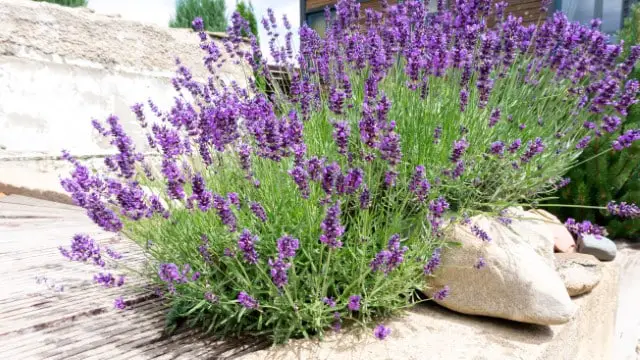
Let’s explore:
- What do deer eat?
- Why deer don’t eat lavender
- Do other animals eat lavender?
- Understanding deer-resistant plants
- Does lavender ward off deer?
- How to ward off deer
What Do Deer Eat?
Deer have a diverse diet.
It varies by season, but some of a white-tailed deer’s favorite foods include fruits and berries, shrubs, leaves, and grass.
Deer like eating food with high nutrient values like fruits. Fruits contain high amounts of sugar, which provides deer with much-needed energy.
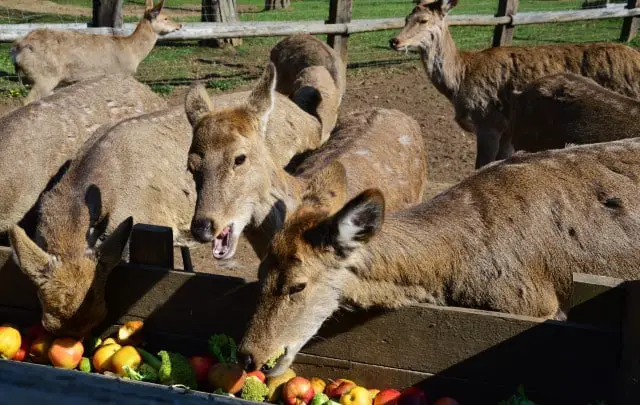
Deer consume a lot more food during the summer and fall than they do in the winter, when food is scarce.
Deer are instinctual creatures, and they know that food is harder to come by when it’s cold. To compensate, they eat whenever they can find food.
When there are limited food supplies, deer are more likely to turn to gardens or nibble on foods that offer little nutrition, like grass.
A garden is an ideal place for deer to find a meal since they have no natural competition. Gardens flourish longer than wild plants, so if deer are having trouble finding food in the wild, they’ll head to your garden.
Why Deer Don’t Eat Lavender?
While lavender and other herbs contain some nutrients, they’re not nutrient-rich. Lavender isn’t beneficial to the deer’s diet.
Unlike some plants (like daffodils), lavender isn’t toxic to deer.
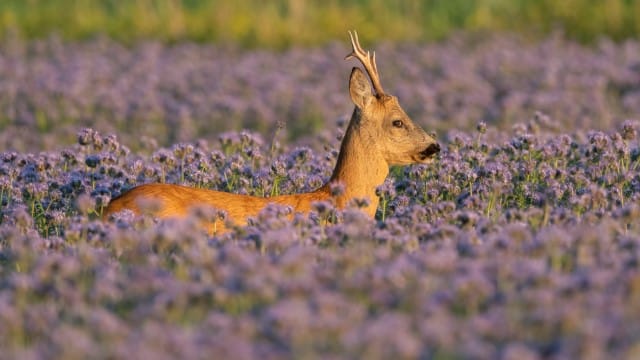
However, deer avoid plants with strong scents. They dislike lavender as well as aromatic herbs like sage, rosemary, and thyme.
These animals also seem to dislike lavender’s texture.
Deer hate plants with unique textures. They avoid sage and velvety plants.
They also avoid scratchy herbs with bristles.
Young deer might try to eat lavender if they don’t have any other good food sources. They will learn their lesson quickly and avoid it afterward.
Do Other Animals Eat Lavender?
Most animals avoid lavender. This includes not only deer but also rabbits, raccoons, and other pests. All these animals have highly developed senses of smell.
If you have a problem with pests in your house, you can use lavender to ward them off indoors. Lavender works great as a potted plant, so you can have some on your porch or by your windowsills.
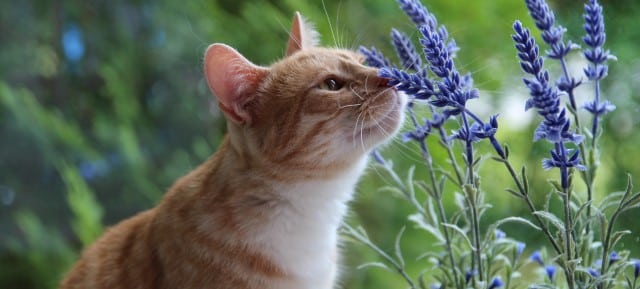
Alternatively, you could cut up lavender and place it in cloth bags or bouquets.
If you notice something negatively affecting the lavender in your garden, check the soil. Worms are good for a garden, but certain snails and other insects tend to do more harm than good.
Understanding Deer Resistant Plants
Most herbs are deer resistant because of their strong smell. If you’re worried about deer getting into your garden, line the garden with herbs.
The herbs will mask the scents of the other plants, helping to keep cervids away from your garden.
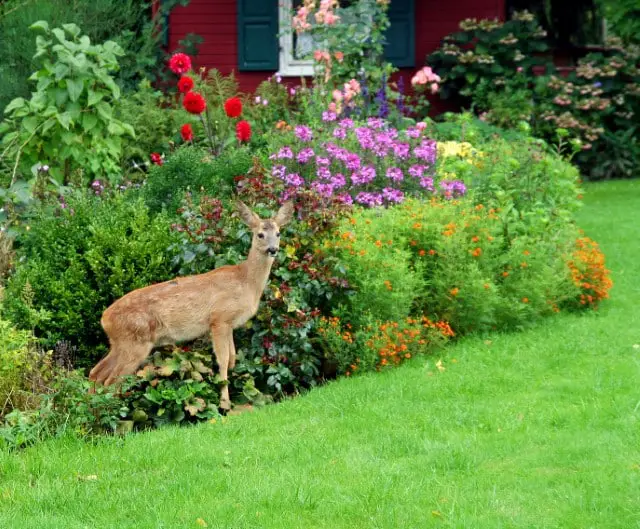
Herbs are a great option because they are super practical plants. If you enjoy cooking, having a fresh herb garden is essential.
Strong-smelling flowers are also deer-resistant. These include peonies, daffodils, and foxgloves. Just because a flower doesn’t necessarily smell strong to humans doesn’t mean that’s the case for deer.
Deer have a much more developed sense of smell than we do. Their noses are highly sensitive, and they are better at picking up the scents of potential toxins.
We have a helpful list of deer resistant annuals if you’d prefer to line your beds with those each year.
Does Lavender Ward Off Deer?
There is a difference between warding off deer and simply being deer resistant. Lavender is resistant to deer, meaning that deer won’t touch it.
That doesn’t necessarily mean it will keep your garden deer-free.
If you have a garden, there are probably lots of scents other than lavender. Deer will be able to smell these as well.
If something smells good, the lavender won’t necessarily repel them from staying away entirely.
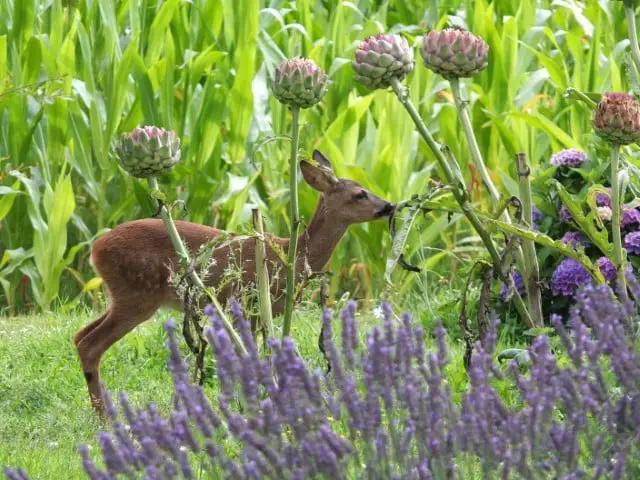
Placing lavender and other herbs on the edge of the garden could help hide the other scents, but you will need lots of lavender.
If your lavender is closer to the center of the garden, deer won’t necessarily smell it as strongly.
A deer’s sense of smell can also be affected by the wind and weather conditions. Heavy rainfall and strong winds could alter the direction the scents are blowing.
So, even if you have lots of lavender, it might not be effective if the conditions aren’t in your favor.
How to Ward Off Deer?
Even if your lavender is doing a good job during the spring and summer, lavender doesn’t bloom annually.
During the winter, your lavender is probably going to be bare. If it’s not blooming, the deer won’t be able to smell it.
If you want to keep deer away from your property year-round, you’ll need to invest in more professional equipment.
Motion-activated sound machines or lights are highly effective, but they can be a nuisance if you have pets.
Fencing can be expensive and generally needs to be very high to keep out deer (because deer are great jumpers).
If you have a large property, this isn’t going to be effective. An alternative is localized fencing.
To keep deer away from certain areas, protect your plants with garden fencing. This is a much cheaper and more practical option than fencing your entire property.
It will also be more effective in keeping birds and other critters from nibbling on your plants.
Deer repellent sprays can be useful if you want to keep deer away from specific areas. Most deer repellent sprays include lavender, peppermint, and citrus.
The problem with repellent sprays is that you’ll need to re-spray fairly frequently.
Final Thoughts: Do Deer Eat Lavender?
As we’ve learned here, deer don’t eat lavender.
This means that it’s deer-resistant. But this doesn’t mean it will work by itself as a deer-repellent.
It’s best to plant your lavender along with other deer-resistant plants, like herbs. This will help keep deer away.
If you have a consistent problem with deer, you’ll probably need to look into more advanced options. In the meantime, happy gardening, and good luck keeping the local deer herd out!

